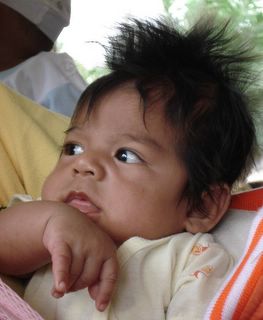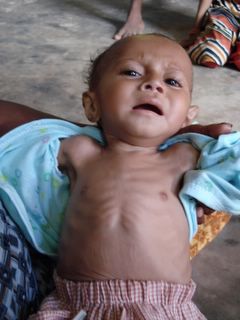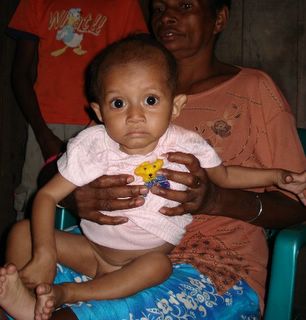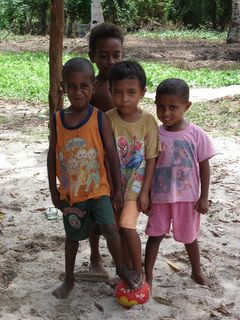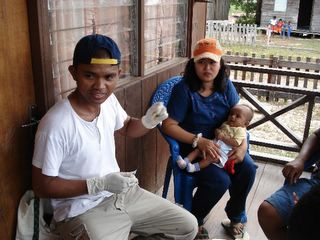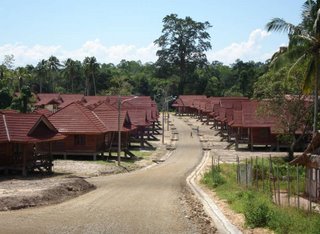Tuesday, September 05, 2006Thursday, June 01, 2006Yogyakarta Relief
i don't think this blog is public, in which case this is a pointless post as all of you will have got this link from me already, but please see my friends (also ex VSO Indonesia) blog at www.patricklynn.whereareyou.net for a way to donate to the Yogyakarta earthquake relief in a slightly different way. The money will go towards people who have suffered long-term or permanent disability as a result of the earthquake - the money will go straight to the centre where Esther has been working as an occupational therapist for the last few years through VSO. It is a good place, and the money won't go 'missing'.
The NGO sector has been able to respond quite rapidly to the earthquake - partly because after the December 2004 tsunami in Aceh, almost every (if not every) International NGO and countless local ones had operations in Indonesia, and most of them are still here. It seems there are the same problems as usual though - lots of aid and money flooding in but major problems in distribution preventing the supplies getting to the people who need it. Being in Papua, readers almost anywhere else will have a far better idea of whats happening in Yogya that me. Its just so sad - Indonesia really gets one horrible blow after another.
As any Caucasian who has spent time in Indonesia will tell you, it's a flattering place to be. Your ego can go from modest to gargantuan in the space of a couple of months if you are not careful. Good days, bad days, fat days, bad hair days, sweaty days, exhausted and ill days - you name it - nothing can stem the flow of compliments about your physical appearance. Whiteness (in women at least) is valued above all else in the world of beauty (it's near impossible to buy a face cream or body lotion that doesn't claim some whitening property). Add to the whiteness hidung mancung or long nose, and I am a supermodel. After a while the compliments wash over you (pretty soon after I realised the young guys outside my door would just as soon fall in love with the next white woman that came along), but sometimes it still amuses me on occasion, and I can't deny that being female has marked benefits when in need. Take, for example, me this past Sunday morning at 2.50am. I wake up having slept through the alarm - my flight to Papua is a 3.45. Another person may have given up immediately, but being someone who is ALWAYS late (even late to arrive in the world if what my mother says is true) I won't give it up as a lost cause until the plane has actually taken off, despite the fact the drive to the airport takes 40 mins when there's no traffic (and of course there is none at this time in the morning). I am in the taxi by 3.05 and the driver says he can make it in 30mins. I told him he would have to do better than that and did he ever - 13mins flat. He then gets this porter from somewhere (normally at that time in the morning they are not to be found) who deals with all my bags while I hare away to the desk. The man at the check-in smiles sweetly and reopens the flight, while his female colleague scowls over in his direction and rolls her eyes... the security guards don't look at the screen as my bags - nail scissors and pen knife inc - sail through the scanner - they only ask where I am from, and when I tell them Scotland, they say for Indonesians, Scottish women are sooooo beautiful. I had to laugh - it was 3.35, face unwashed, hair a nest and teeth unbrushed.
The flight over to Nabire was beautiful. Tens of tiny tropical islands scattered in a blue sea. The photo doesn't do it justice.
HIV and AIDS awareness in Papua is years ahead of Flores. and that people are not always faithful in marriage - something that the Florinese still struggle to acknowledge openly. Papua has many of the things that fueled the early stages of the HIV epidemic in Southern Africa - large mining sites with thousands of men away from home for months a time, with an accompanying thriving sex industry; geographically disparate communities connected by busy long-distance transport routes (but here these routes are plyed by boats, not trucks); and conspiracy theories about condoms and AIDS being brought to Papua by the government to kill off Papuans,similar to popular beliefs in South Africa about AIDS being a new tool by a racist government to control the black population, and condoms its method of administration. I will be here for 3 weeks to help with the HIV survey we are carrying out to inform our new program here. I look forward to seeing the results of the survey. The local government confirmed what everyone had been thinking all along about the local monument in the middle of the main roundabout and put its phallic shape to good use - it has worn a giant yellow condom since World AIDS Day 2005. I tried not to notice the NEEDLE sticking through the end, rendering the giant condom useless... Last night I had a visitor in my hotel room and decided to try out the macro setting on my camera. It's not bad - this wee guy was only the size of a 10p coin.
Sunday, May 14, 2006 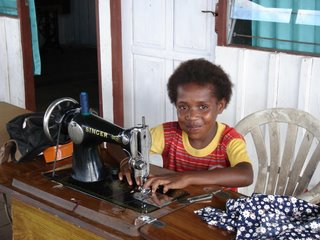 The next village we visited was Tomu. They have just started a women's sewing group there to make and sell clothes. The start up money is coming out of the BP compensation fund, and then the field staff from the BP community development unit will help them get it up and running (training etc). Some of the sewing machines were Singer - I am sure not Clydebank originals but made me smile all the same. This girl is not actually in the sewing group (no child labour ha )but she just wanted to have her picture taken. This other wee one had her new dress on but was really grumpy to have her picture taken ...  Me and Salim (the local nurse) were cooking lunch here, in the kitchen of the clinic. Bit fat juicy prawns 2 quid for a kilo ... As usual the fact that I can cook (because of course at home in my castle usually all my maids cook for me) was met with laughter and surprise. I was praying I didn't f- it up to prove them all right but I managed to pull it off I reckon. Me and Salim (the local nurse) were cooking lunch here, in the kitchen of the clinic. Bit fat juicy prawns 2 quid for a kilo ... As usual the fact that I can cook (because of course at home in my castle usually all my maids cook for me) was met with laughter and surprise. I was praying I didn't f- it up to prove them all right but I managed to pull it off I reckon.Prawn fishing is the main source of income here, and a very lucrative business by Indonesian standards - the fishermen get 20-100kg a day and sell for Rp25,000/kg (just under 2 quid). Even after taking off the cost of fuel and ice, it is still possible to make a pretty reasonable income. That said some days are bad days, and most of the men only go out 3 days a week ... It's strange though - the standard of living is still so basic, but actually if you work it out, they can make a lot more from the prawns than if they go to work on the plant (and even that is a pretty decent local salary too).  The water was high when we wanted to go home, so the speedboat was able to reach the jetty (left) - apparently sometimes it can't get in as the water is too low, so you have to walk through the mud for a couple of kms to reach it. Needless to say I was quite happy to avoid that scenario ... The water was high when we wanted to go home, so the speedboat was able to reach the jetty (left) - apparently sometimes it can't get in as the water is too low, so you have to walk through the mud for a couple of kms to reach it. Needless to say I was quite happy to avoid that scenario ...
 This is one of the dukun paraji, or traditional birth attendants I met in Taroy. Part of the program here has been training women like this in safer delivery practice and providing sterile dukun kits. This was at one time the backbone of public health programs to reduce maternal mortality in poorer countries, but in recent years, research has shown that it doesn't seem to reduce the death rate. However, the fact of the matter is that in many of these villages there is NOONE else at all to help women give birth, so trying to reduce harmful practices, and protect good ones, is a just a little common sense. This is one of the dukun paraji, or traditional birth attendants I met in Taroy. Part of the program here has been training women like this in safer delivery practice and providing sterile dukun kits. This was at one time the backbone of public health programs to reduce maternal mortality in poorer countries, but in recent years, research has shown that it doesn't seem to reduce the death rate. However, the fact of the matter is that in many of these villages there is NOONE else at all to help women give birth, so trying to reduce harmful practices, and protect good ones, is a just a little common sense. Another contradiction - credit for your mobile phone is being sold here! In a place where most families do not even have toilets, there is now Telkomsel coverage - thanks to BPs plant opening and a new antenna being erected.  This is the view from the jetty in Taroy, one of the so called "in-directly affected" villages in the project area. They do not have to be resettled, but their fishing grounds will be affected by the development, and as such qualify for compensation. This is the view from the jetty in Taroy, one of the so called "in-directly affected" villages in the project area. They do not have to be resettled, but their fishing grounds will be affected by the development, and as such qualify for compensation.In fact, although the amount of money allocated to these villages is much smaller, it is still a very significant amount of money. What's more, it doesn't go through the government at all so the classic Indonesian corruption potential is bypassed. The way it works is that BP's community development team facilitate a planning process in the village. When a budget has been allocated by the community, up to the total value of that years compensation, then BP release the funds directly to the village, for each planned activity. In this village, part of the money last year was used to build walk ways (see left) - previously the whole village was just a big mud bath apparently ...  In some ways I think this is a far better way for BP to provide its compensation. There was a completely different attitude in this village compared to the one that has been resettled and everything rebuilt. A real sense of people wanting to help in the process, not just sit and wait for BP to provide everything. They have so far built a school and a clinic and put boardwalks down throughout the village. This is the Village Secretary (left) and another guy, who I met when I first got off the boat. They were very keen to have their picture taken, but in true Indonesian style, immediately stopped smiling as soon as the lens pointed their way. In some ways I think this is a far better way for BP to provide its compensation. There was a completely different attitude in this village compared to the one that has been resettled and everything rebuilt. A real sense of people wanting to help in the process, not just sit and wait for BP to provide everything. They have so far built a school and a clinic and put boardwalks down throughout the village. This is the Village Secretary (left) and another guy, who I met when I first got off the boat. They were very keen to have their picture taken, but in true Indonesian style, immediately stopped smiling as soon as the lens pointed their way.
Thursday, May 11, 2006
The photos below show the kind of view that confronted me as we went up the river to the village (all transport is by boat here). The picture on the right is of a gathering in the house of a baby that died yesterday, only one day old. It reminds me that despite the shiny new houses, the problems associated with poverty are still very apparent. The infant and child death rate here is very high - much higher than elsewhere in Indonesia. In Saengga, a village of only 100 hundred families or so, two children have died in the last week. I saw the father of one of them sitting outside his brand new house, beside the grave of his 1.5 year old - they had buried her just outside. He had put cans of coke and fanta on the grave for her to drink. It was so sad. It appears that there is an almost total failure of the health system here - correct diagnosis and treatment is a rarity, and the referral system (to more expert help and facilities) is ad hoc at best.
 These guys are taking empty cardboard packing boxes and packing material for fragile goods over to the village, ready for the big move next week. BP seem to have thought of everything - even down to the packing! I had a wry smile on my face though - each family gets 15 boxes or so; I doubt very much they have enough stuff to fill more than 4 or 5 ... These guys are taking empty cardboard packing boxes and packing material for fragile goods over to the village, ready for the big move next week. BP seem to have thought of everything - even down to the packing! I had a wry smile on my face though - each family gets 15 boxes or so; I doubt very much they have enough stuff to fill more than 4 or 5 ...
Today I went to the resettled villages. In a nutshell, BP is building an onshore processing plant for gas piped from its offshore operation in Tangguh. In order to put the processing plant where it wants, BP had to relocate an entire village, called Tanah Merah. As compensation for this, BP have built a new village - one house per family, including kitchen, bathroom and toilet, running water and electricity. As part of the deal, BP have also built schools, sports facilities, churches, mosques, health facilities etc - in short its very complete. The houses are beautifully done, and I am pretty sure none of those families ever imagined they would have a house like this in their lives. Because the new village (Tanah Merah Baru) is sited on the land belonging to another village (Saengga), that village has also been compensated similarly, one house per family. In Tanah Merah Baru, families are already living in their new houses, but in Saengga the moving date is next week. This post (below left) shows Sisilia's (one of the health project's local workers) old house, where she lives with her husband and 5 children. Next Friday she will move to her new house (below right). She and her husband are so over the moon it was lovely.
Wednesday, May 10, 2006 |

